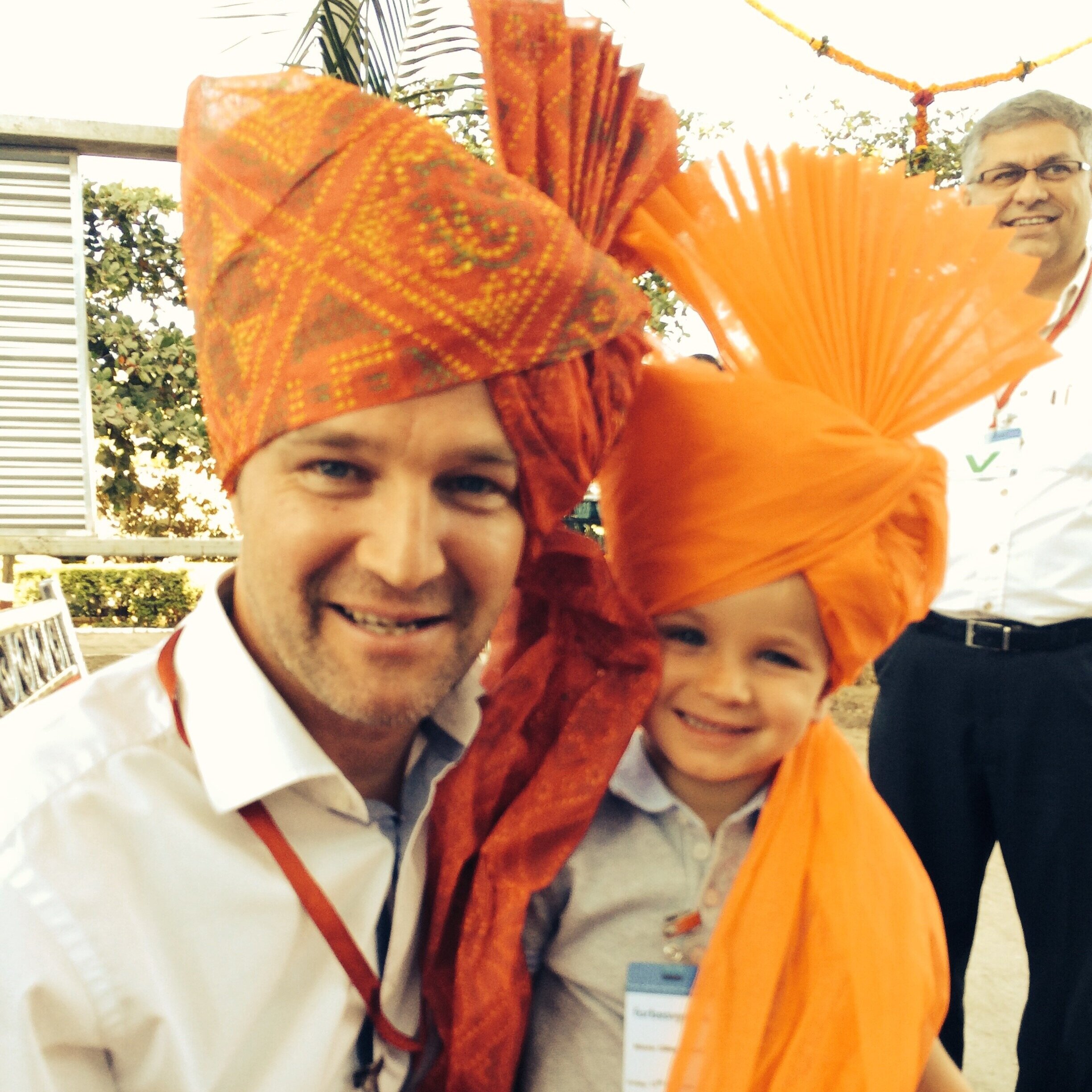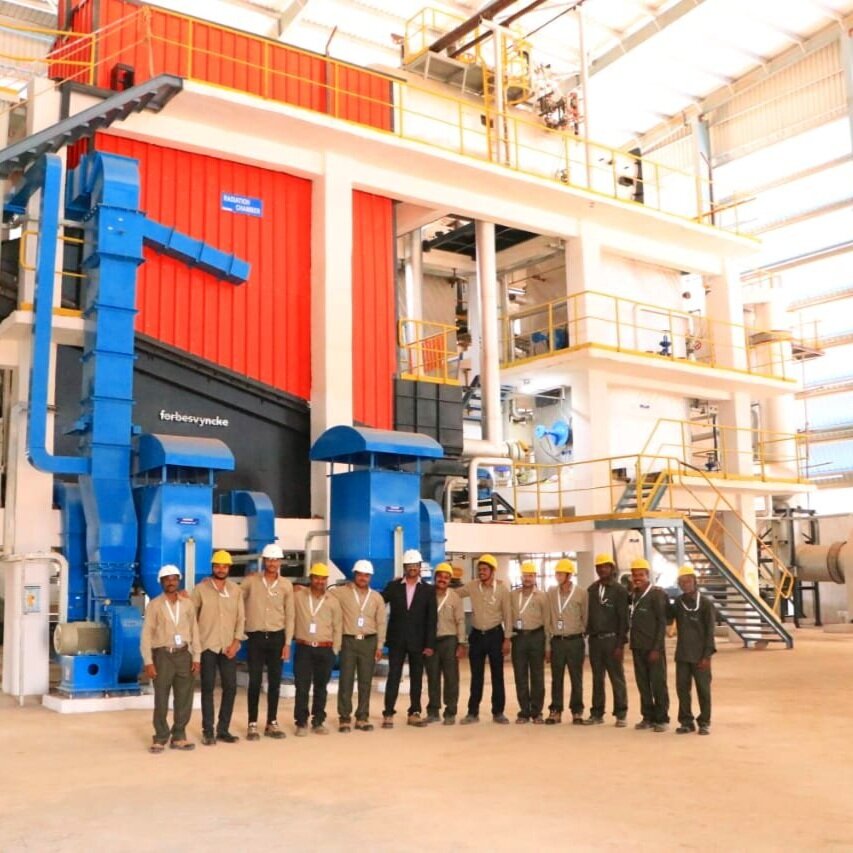For many years, India was a fly-over country for Peter Vyncke, who runs the Flemish family business Vyncke together with his brother Dieter. "Before my brother and I took the helm, I was in charge of Vyncke's Asian department in Kuala Lumpur, Malaysia. At the time, we were fully focused on South-East and North Asia, India was not in our sights. Until I suddenly lost an important order from an existing Malaysian customer to an Indian competitor. There was only one right strategy for that, fight them on their own turf."
CEO Peter Vyncke and his son Gilles during a traditional first-fire of a ForbesVyncke power plant
A biomass energy plant of the Belgian-Indian joint venture ForbesVyncke
Peters great grandfather, as the Flemish CEO likes to describe it, came up with the ingenious idea of converting coal-fired boilers into biomass boilers 100 years before the Kyoto treaty. "Those first Vyncke boilers were fired with waste from the flax industry, but now they can be used in almost any sector. We can convert all kinds of waste products into energy, from cocoa shells to wood chips." Vyncke's energy plants therefore sell well in countries around the equator, where large industries produce more organic residual waste, such as the coffee or palm industries.
Belgian company Vyncke has been active in Asia for more than 40 years, but only ventured into the Indian market ten years ago. "From 1996 to 2000, I managed the Asia branch of Vyncke from Kuala Lumpur," says the Vyncke top executive. "We were mainly focusing on China and the south-east of the continent and not at all on India. Then suddenly, one of my major Malaysian customers was snatched up by a competitor from India. That made me realise that I had to look into the country. Not only to see what opportunities there were for us, but also to start making life difficult for that competitor on its own territory."
Joint venture with Forbes Marshall
As the idea of starting up in India began to bubble up at Vynckeneers, Vyncke received a special visit in Belgium. "My father travelled all over the world for Vyncke and on one of those trips he ended up in Pune, at the Indian company Forbes Marshall. He had left a message in the guestbook there. To our surprise, 25 years later, a Forbes Marshall employee suddenly turned up on our doorstep with a copy of that guest book entry in his hand." The Indian company specialises in process efficiency and energy saving for industry and at the time was looking for a partner to conquer the biomass market in India with. "They just didn't have the technical knowledge and that's how they ended up with us, says the Vyncke director. "We immediately had a very good click. Forbes Marshall is run by two brothers, and we are also two brothers at the helm of Vyncke. We have the same attitude in how we do business, you can't do business without a bit of fun. In addition, we complement each other perfectly in terms of knowledge: we the technical knowledge, they the knowledge of the Indian market."
The companies therefore decided to formally establish the joint venture ForbesVyncke in 2010. "That was the best way for us to enter the Indian market. We could certainly have done it on our own with our experience, but it would have taken us much longer to get up and running," explains the Belgian CEO. "Forbes Marshall took charge of setting up the company and immediately put his best people forward. As a result, we got off to a flying start. Within two years we were already in every corner of the country, selling only to premium customers at about 20-30% higher prices than our competitors. We now have an annual turnover of around 20 million euros."
Give each other space in the cooperation
Peter advises any company considering starting up in India to find a good partner. "When companies say they want to start up on their own, I always ask, 'Are you really sure?' India is a country of 1.3 billion people and the bureaucracy is a maze". Working with a partner who knows the market and the way it works takes away a lot of start-up problems. "Our partner is responsible for the operations of the joint venture, so everything from sales and HR to legal is in their hands. This allows us to concentrate on our core business, the technology of the product. Because we both focus on our strengths within the joint venture, the company runs like clockwork, says Vyncke. "If you opt for such a construction, you must not micro-manage matters that are outside your remit. Give the other person the space and confidence to fill in the framework that you draw up together, as you see fit. Nobody in India is waiting for a Western company to come and tell them what to do, like some kind of colonialist."
Don't sell it as green, but for the money".
According to Peter, the advice not to be pedantic as a foreign company in India also applies to the product you market. "Take our product, for example, which is being used by companies in Europe for its higher morals. Namely because it replaces fossil fuels and is CO2 neutral. But in India, that is not the motive at all. There, it helps companies enormously in terms of costs, to be able to make energy from the residual products they have left over." Biomass is a lot cheaper than oil or gas in a country like India. India is therefore also one of the few countries in the world where more than 70% of the population depends on biomass for its energy needs. "So you shouldn't market such a product with a pedantic tone, because it is better for the environment. For India, it is a cheaper solution for the country's energy needs. Don't sell it as green, but for the money."
ForbesVyncke has had its biomass power plants heavily adapted to the needs of the local Indian market. "The standard in India is still different, even with the international companies we work with," Peter explains. "While in Europe the operation is fully automated, in India they are not prepared to pay extra for it. The labour costs are still lower than the costs they would have to invest for a fully automated installation. As a company, you have to take that into account and not look down on it." The CEO therefore advises any start-up company in India not to start with too big expectations and strategies. "Growing in the Indian market takes time. Stay close to yourself, your product and find a good partner! We really have the best partner in the world. Because of that partnership, we have now left that Indian company, which woke me up 20 years ago by hijacking my Malaysian client, far behind."


